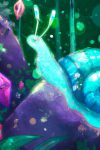
After their foray into the city, Csialeide didn’t restrict her daughter’s travel from the island, letting her come and go as she pleased. Una had made the decision to take on the city as devotees, despite Csialeide’s cautions. She frequently bequeathed them gifts and miracles, delighted by their enthusiastic response to her every action, the church of Avis taking root as a city religion with her as their patron saint and goddess. It was a thrall many gods fell under, the euphoria of worship. ‘Their lives are so vibrant, and they have such strange, complex emotions’ she tried explaining to her mother, but Csialeide still couldn’t understand the appeal. Perhaps if she had her own human form she might have better understood, but despite the bodies of her sacrifices entombed within her shell, she had not formed herself one, content as she was.
As Una was increasingly absorbed with the human city, Csialeide had taken to other hobbies, resuming her calling to collecting secrets. Every whisper in a shell was a message to her that she was honor bound to listen to, without judgment, and she had reneged on her duties for too long while Una preoccupied her. She had quite the backlog of secrets to process. She missed the simpler days a little, when Una was a hatchling, just formed and satisfied with the pool in the glade. But somethings must come to an end, and Una had grown from hatchling into a young goddess.
The sacrifices she had made for her daughter were all ones she had been glad to make, worth the price, even if it hadn’t felt that way at the time, if at times she even regretted having a daughter. She felt Una’s pain as if she herself were experiencing it firsthand, sacrificed her emotional wellness prioritizing Una’s needs over her own, exhausted her body giving birth to her by feeding Una her own godseed. She had felt at times, as if her own needs were irrelevant, an implicit guarantee that of course she should sacrifice to the greater importance of Una’s happiness. But with some distance, some perspective, it was worth it to see Una’s smile.
She wondered if the humans who made sacrifices to her felt the same. That the lives they gave up to her as tribute for living on her shore were worth the price. Did the humans chosen go quietly? Did they believe in the importance of their deaths, or did they go unwillingly, selected by their peers? Reciprocity was a keystone of a god’s existence, quintessential to their birth and an instilled virtue thereafter. It was impossible to do without. But to be inequitable was human, the disbalance in their lives an indisputable fact. She understood that a little bit better now, the asymmetry of a relationship, where what was put in didn’t feel proportionate to the returns. Her dependence on Una’s happiness was unknown to her daughter. And yet. She had no regrets. She hoped, a little, that the humans felt the same, for their sakes.
She wondered, as she watched her daughter flit back and forth across the city, observing their human lives, if she had done a good job raising Una. She could have introduced her to other divine beings sooner, rather than keeping her so sheltered, could have given her more friends, if that would have changed towards an interest in gods, rather than humans. If she would have been less beguiled by their worship. But Una was still growing, still learning. And no matter how she grew up, Csialeide couldn’t wait to see who Una would become.



